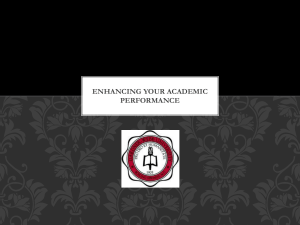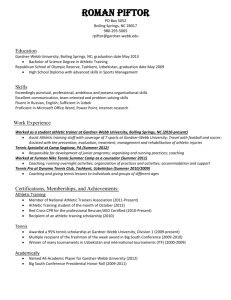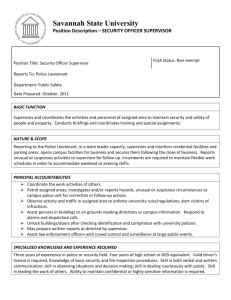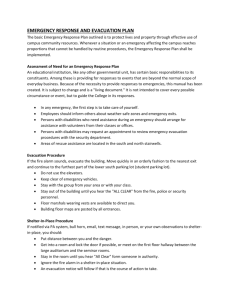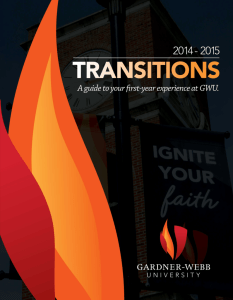Emergency Response Guide - Gardner
advertisement
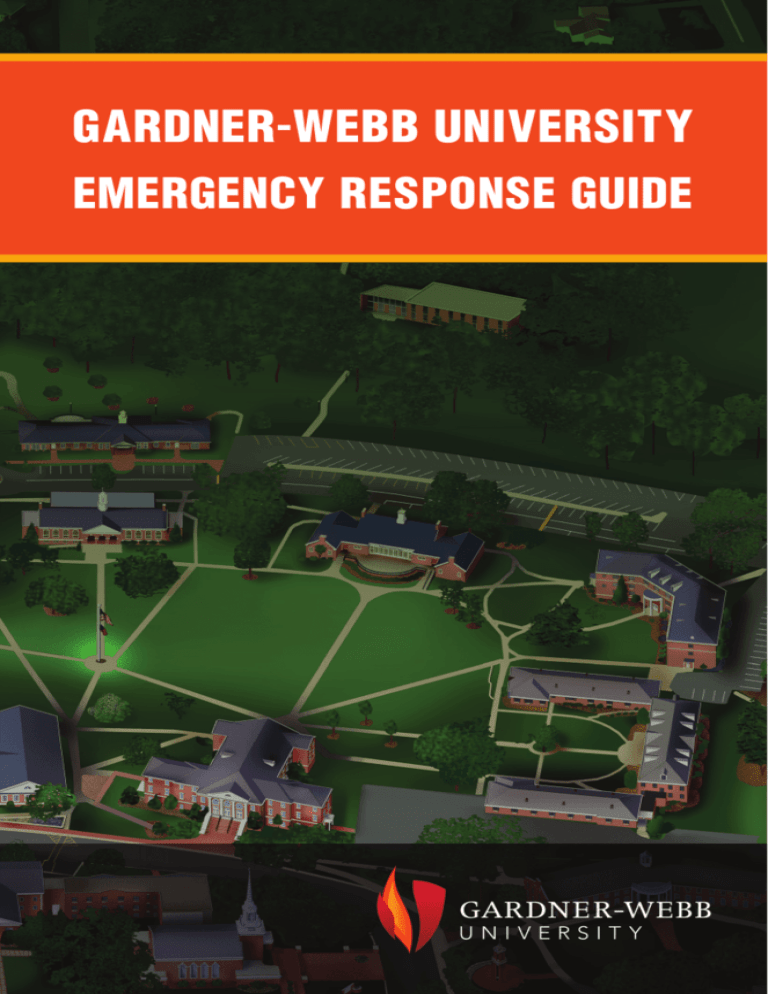
GARDNER-WEBB UNIVERSITY EMERGENCY RESPONSE GUIDE REPORTING AN EMERGENCY DIAL 911 The fastest, most direct way to obtain emergency assistance is to dial 911. Remember…STAY CALM. Help others remain calm. When you are reporting an emergency situation give concise, accurate answers to the 911 operator. Do not hang up until told to do so. Direct someone to call 4444 (University Police) to alert officers that an emergency situation exists. What the 911 operator will need to know first: Location of emergency Nature of the problem The above procedures are to be used when reporting any emergency situation that requires an immediate response from Law Enforcement or Emergency Medical Services. 2 EMERGENCY COMMUNICATION In an emergency situation, notification will begin and may use one or all of these components: Text messages E-mail messages Outdoor warning system Cell phone users can receive text messages in the event of an emergency by opting in to the Emergency Notification System. The messages will be brief and will be activated by the University Police Department. All campus email users will also receive brief email messages regarding the emergency. Further information will be posted online at gardner-webb.edu/campus police/ emergency preparedness when it becomes available. The University has determined that the following situations may require sending emergency messages: Imminent danger, including a major fire or shooting Imminent disaster, including an earthquake or flood Severe weather, including tornado and severe thunderstorm warnings Additionally, the system may be used to alert the campus of major interruptions of campus operations, such as snow closings. Sign up to receive emergency alerts on your cell phone: Log into WebbConnect with your user ID and password. Click the Maintain Info tab. Follow instructions. WARNING SIRENS Gardner-Webb University has a tone- and voice-message outdoor siren located at Bost Gym. This siren is intended to warn people outside campus buildings of impending severe weather and other emergencies. It may not be heard inside buildings. In an emergency, the sirens will sound a tone and a brief voice message announcing the nature of the emergency. 3 EVACUATION PROCEDURES Evacuation of the University will generally fall into two categories: Limited evacuation of a building or designated area. General evacuation of the entire campus. LIMITED EVACUATION In general, you should plan ahead for possible evacuations. Know evacuation routes from your office or classroom and the campus. If the fire alarm is activated, leave the building immediately. Do not assume it is a false alarm. Do not return for personal items. Do not go into the restrooms. Do not use the elevators. Direct visitors or anyone needing assistance to stairwells and exits. When you are outside, check in with your supervisor, department personnel or instructor so everyone can be accounted for. Make sure you have your GWU and personal identification with you. GENERAL EVACUATION If the entire campus is evacuated: 4 Faculty and staff should return to their homes or other safe destinations unless told otherwise. Students who can provide their own transportation should leave the campus. Students who cannot provide their own transportation should leave campus by any means. Students should make contact with family members ASAP. G ER E N A D UAT C A EV SEVERE WEATHER Dangerous weather can include thunderstorms, lightning, tornadoes and winter storms. Stay alert to weather conditions and seek shelter if threatening weather approaches. WEATHER ADVISORIES A watch means conditions are favorable for the development of severe weather. Monitor the situation closely if the weather deteriorates. A warning means severe weather has actually been observed and is imminent. Seek shelter immediately. WEATHER WARNINGS Tornado warnings are issued by the National Weather Service (NWS) when a tornado is approaching the area. The Boiling Springs warning siren will sound a tone (three long wails) that a tornado is approaching and people should take shelter immediately. The Gardner-Webb warning siren will sound a tone (one long wail) and provide voice instructions. Emergency alerts will be sent to cell phones, campus email and campus telephones. Severe Thunderstorm Warnings are issued by NWS when a thunderstorm is reported within the immediate area. Warning sirens sound a tone (three long wails) that a thunderstorm is nearby and people who are outside should seek shelter inside. SEVERE WEATHER TIPS In a thunderstorm, no place outside is safe. A substantially constructed building offers the best protection. Stay away from telephones, electrical appliances and plumbing. If you hear thunder, you are close enough to the storm to be struck by lightning. Find safe shelter immediately. 5 WINTER WEATHER A winter storm in Western North Carolina can last for several days and disrupt travel, utilities and other services. Plan for the worst and have adequate clothing, food and water ready before it is needed. For updates on campus closings Dial 1-877-GWU-SNOW (498-7669) or visit gardner-webb.edu. SHELTER-IN-PLACE Shelter-in-place means to stay where you are to avoid possible danger outside. You could be directed to shelter-in-place in the event of severe weather, hazardous material release, a suspicious intruder or hostage situation. 6 Keep students in class or in their residence hall room until authorities give the all-clear signal. Stay away from windows, doors and outside walls. Authorities may not be able to provide information about what is happening immediately. In the event of severe weather, basements generally offer the best protection. Otherwise, go into an interior room or hallway on the lowest floor possible. In the event of an intruder, secure doors and seek concealment away from windows and doors. Turn off the lights and close the blinds if the room is so equipped. Account for everyone who arrives in the shelter. Stay in the shelter location until you receive an all-clear message from authorities. Every situation presents different circumstances; running away from the situation to a safe area is always an option. WORKPLACE VIOLENCE Types of workplace violence: Physical assault and/or threat. Stalking or continuous harassment that causes fear, worry or intimidation. Actions aimed at disrupting or sabotaging operations. Indirect threats, such as "I know where you live." If the violence is life threatening, call 911 and report your location, weapons involved, injuries and a description of the person making threats. If it is not life threatening, advise your supervisor or Human Resources. If you are confronted by a threatening person: Leave the area, if possible. Call 911/4444. Try to stay a safe distance away. Try to calm the person. Try to get the attention of a co-worker who can call for help. Listen to the person and let him/her do most of the talking. Use delaying techniques to give the person time to calm down. Acknowledge the person's feelings. Be respectful and empowering. Be reassuring and point out choices other than violence. Don't belittle, criticize, agitate or argue with the person. Don't reject all of the person's demands from the start. Don't use body language or speech that challenges the person. Don't make sudden movements. Don't make false statements or promises. 7 BOMB THREAT Bomb threats should always be treated as though there actually is a bomb until all facts are evaluated and authorities can thoroughly search the area. If you receive a bomb threat, try to obtain the following information: Where is the bomb? When will it explode? What does it look like? What will cause it to explode? Did you place the bomb? Why did you place the bomb? What is your name? Are you an employee? Where are you calling from? If you receive an email bomb threat or a suspicious package, note any pertinent information such as background noises, gender of caller, voice pitches and patterns, then call 911 and evacuate the building. Scan your area for things that may be out of order. This will greatly reduce the amount of time required to search a building. Employees can recognize objects that are out of place. That information may help authorities search more quickly. When leaving the building, take your personal belongings with you. Leave doors, offices and storage spaces open and unlocked. Every room will be searched. 8 HAZARDOUS MATERIALS CHEMICAL EXPOSURE If toxic chemicals come in contact with your skin, immediately flush the affected area with clear water. Remove contaminated clothing. Call 911/then 4444. Move to a safer area. CHEMICAL SPILL For spills, releases or incidents requiring special training, procedures or equipment, take these actions: Immediately evacuate the spill area. If building evacuation is required, pull the fire alarm. Call 911/then 4444. Seal the area to prevent further contamination of others. Anyone who is contaminated by the spill should avoid contact with others as much as possible and remain in a safe area nearby for emergency treatment. Wash off contamination and begin any required first aid. Do not attempt to contain or clean up spills unless you are qualified to perform such work. Do not re-enter the area unless directed to do so by emergency personnel. UTILITY OUTAGES In the event of a power failure: If you are in a dark area, proceed cautiously to an area that has emergency lighting. Assist others who may be unfamiliar with the building or the area. Turn off equipment such as computers and monitors to avoid potentially serious damage when the power is restored. If you are in an elevator, use the emergency button or telephone to alert authorities. DO NOT attempt to open the elevator car door or shake the car to move. Do not attempt to correct the problem. Evacuate the area and call University Police at 4444. 9 MENTAL HEALTH CRISES Anyone can experience stress associated with academic demands, family problems, social relations, work, finances and cultural experiences. The inability to cope with emotional distress can lead to disruptions in overall functioning. STUDENT COUNSELING SERVICES Students can seek help from the Counseling Center. Appointments can be scheduled by phone or in person. To schedule an appointment for individual counseling, call 704-4064563 between 8 a.m. and 4:30 p.m. Monday through Friday. Emergency services are available on a 24-hour basis. After hours and on weekends you can call Gardner-Webb University Police at 4444. The officer will take your first name and phone number and have the on-call counselor call you back. HANDLING A CRISIS Sometimes a person's usual coping skills are overwhelmed. The signs can include: Highly disruptive or aggressive behavior. Overt suicidal threats (written or verbal). Homicidal threats (written, verbal or a history of violence). Inability to communicate (incoherent, garbled or slurred). Loss of contact with reality. If you have concerns that someone is experiencing such a crisis, call 4444 to request assistance. While waiting for aid to arrive (if you perceive no threat to yourself or others), you should: Provide a safe, secure, quiet environment. Invite the person to stay until help arrives. Listen actively and show empathy. Maintain a straightforward, supportive attitude. Don't leave the person alone unless you feel threatened. Don't try to restrain the person if he or she wants to leave. 10 TITLE IX REPORTING SEXUAL ASSAULT/ IMPORTANT CONTACTS OPTION 1 Reporting to individuals on a confidential basis. However, in certain cases, total anonymity cannot be guaranteed, but privacy will be respected. A University counselor is oncall 24 hours a day at 4444. A trained clergy member from the Chaplain’s Office can be reached at 704-406-2176 for students and at 704-406-4279 for faculty and staff. Contact any member of the Student Development staff, Residence Life staff or University Police staff. If an immediate threat is assessed to be directed at the Gardner-Webb community, a campus alert may be issued, but with no information identifying the victim. Please note—if you do not initially wish to pursue charges, you may do so at a later time. If you choose Option 1 and do not wish to pursue charges, all efforts to bring the accused to a student conduct board or criminal charges will not commence. OPTION 2 This is for students who believe they have been the victim of sexual harassment, sexual violence, domestic or dating violence or stalking by another member of the GardnerWebb University student or educational community. This process may involve an investigation by the Title IX Compliance Officer or by his designee and the student conduct process. Contact the Gardner-Webb University Title IX Compliance Officer, Dr. Cary Poole at 704-406-2155 or cpoole3@gardnerwebb.edu. You may contact any member of the Student Development staff, Residence Life staff, or University Police staff who will contact the Title IX Compliance Officer on your behalf. Gardner-Webb University will conduct a thorough and prompt impartial investigation into any reports of sexual misconduct. 11 OPTION 3 Contact University Police at 4444. Contact the Boiling Springs Police Department at 704-4349691 if the incident occurred off campus, but in town. An investigation will be conducted by University Police with the possible assistance of the Title IX Compliance Officer. A completed investigation report will be forwarded to the Office of the County District Attorney for review and possible prosecution under applicable law of the State of North Carolina. Please note—All prosecution under Option 3 occurs in the criminal courts and not through the campus conduct process. Gardner-Webb University will support law enforcement as requested and will abide by lawful orders and directives. OPTION 4 This is a combination of Option 2 and Option 3 which means investigations may occur simultaneously on campus and off campus. Student conduct and criminal investigations processes will occur independently of each other. Option 4 is the most in-depth of the options, but it may involve the victim having to participate in two separate investigations and processes. Gardner-Webb University reserves the right to conduct its investigations independent of the criminal process which means the University’s investigations may occur prior to, simultaneously with, or following civil or criminal proceedings which will occur off campus. 12 CONTACTS TITLE IX COORDINATOR Dr. Cary Poole, Assistant Vice President for Title IX Compliance, Tucker Student Center, Room 303 704-406-2155/cpoole3@gardner-webb.edu TITLE IX DEPUTY COORDINATOR—for complaints related to faculty or academic personnel within their respective areas Dr. Doug Bryan, Associate Provost for Academic Development Tucker Student Center 704-406-4398/dbryan@gardner-webb.edu TITLE IX DEPUTY COORDINATOR—for complaints related to athletics Ms. Pam Scruggs, Associate Athletics Director and Senior Women’s Administrator Lutz-Yelton Convocation Center 704-406-4341/pscruggs@gardner-webb.edu TITLE IX DEPUTY COORDINATOR—for complaints against nonfaculty employees Mr. Scott White, Director of Human Resources Webb Hall 704-406-4259/swhite@gardner-webb.edu TITLE IX DEPUTY COORDINATOR—for complaints related to students Ms. Sarah Currie, Dean of Students Tucker Student Center 704-406-2385/scurrie@gardner-webb.edu TITLE IX DEPUTY COORDINATOR—off-campus and distance learning students Dr. Bobbie Cox, Associate Provost for Adult and Distance Education Washburn Hall 704-406-4627/bcox@gardner-webb.edu UNIVERSITY RESOURCES SART (SEXUAL ASSAULT RESPONSE TEAM) Please contact University Police at 704-406-4444 who will contact a 24/7 on-call counselor CAMPUS COUNSELING CENTER Cindy Wallace 704-406-4103/cwallace@gardner-webb.edu 13 UNIVERSITY POLICE Chief Barry Johnson 704-406-4440/bjohnson@gardner-webb.edu VICE PRESIDENT FOR STUDENT DEVELOPMENT Dr. Dee Hunt 704-406-4373/dhunt@gardner-webb.edu DEAN OF STUDENTS Sarah Currie 704-406-2081/scurrie@gardner-webb.edu RESIDENCE EDUCATION John Johnson 704-406-4303/jrjohnson@gardner-webb.edu CLEVELAND COUNTY RESOURCES CLEVELAND COUNTY ABUSE PREVENTION COUNCIL 24-hour crisis line 704-481-0043 BOILING SPRINGS, NC POLICE DEPARTMENT http://www.boilingspringsnc.net 704-434-9691 SHELBY, NC POLICE DEPARTMENT http://www.cityofshelby.com/govt/dept_police/index.php Non-emergency 704-484-6845 EMERGENCY 9-1-1 CLEVELAND COUNTY SHERIFF’S OFFICE http://www.clevelandcounty.com/sheriffs_office 704-484-4888 CLEVELAND COUNTY DISTRICT ATTORNEY’S OFFICE VICTIMS’ RIGHTS http://www.ncdistrictattorney.org/27B/victims_rights.htm 704-476-7810 STATE AND NATIONAL RESOURCES NORTH CAROLINA SEXUAL ASSAULT RESPONSE TEAM http://www.nccasa.org NORTH CAROLINA DEPARTMENT OF PUBLIC SAFETY https://www.ncdps.gov SAVAN–Statewide Automated Victim Assistance and Notification. SAVAN is a free, anonymous, computer-based telephone program that provides victims of crime with two important services: information and notification. The SAVAN program is designed to provide you with a quick, easy access to offender information and to alert you when an offender’s custody status changes. www.ncsavan.org NATIONAL SEXUAL ASSAULT HOTLINE 1-800-656-HOPE (4673) NATIONAL DOMESTIC VIOLENCE HOTLINE 1-800-799-7233 14 CRITICAL INCIDENT/ACTIVE SHOOTER During a Critical Incident each faculty/staff shall secure all students and/or persons in their immediate control (including injured persons) to the closest classroom, lab or office located inside the building and secure the door by locking it. Ensure that all persons present remain QUIET. CLOSE all blinds and turn OFF all lights. Once the room is secured, providing that all students and/or persons are without injury and not in need of medical care, place the GREEN placard provided in the Critical Incident Package under the door and post it in the window (if applicable) so that it is visible by the Response Teams and Emergency Medical Personnel outside the room and outside the building. Once the room is secured, if any students and/or persons are injured or in need of medical care, place the RED placard provided in the Critical Incident Package under the door so it is visible by the Response Teams and Emergency Medical Personnel outside the room. If no placard is visible, Law Enforcement will assume that an immediate response is needed in that room. Once a CRITICAL INCIDENT is declared as defined above and the room is secured, under NO circumstances does any faculty/staff or any student or person inside the secured room open the door without the express direction of University Police or any other Law Enforcement Officers immediately present at the door to provide evacuation and/or medical care. Allow all Internet access devices such as computers and cell phones to remain ON and logged onto the Gardner-Webb website for information and communication purposes. Ensure that all cell phones, TVs, computers, or any other electronic devices are turned to vibrate or that the volumes are turned down so the noise of these devices will not draw the attention of an intruder(s). Report any information regarding the Critical Incident as defined above to University Police at 704-406-4444 or 911 without drawing attention to yourself or to the students and or persons that you are responsible for. NOTE: It is important to understand that during a Critical Incident as defined above, the efforts by Law Enforcement and the responsibility of the faculty and staff at Gardner-Webb University is to MINIMIZE the loss of life. 15 Upon request, this publication can be made available in an alternate format. Please make a request by calling 704-406-4444 or emailing tharp@gardner-webb.edu.

